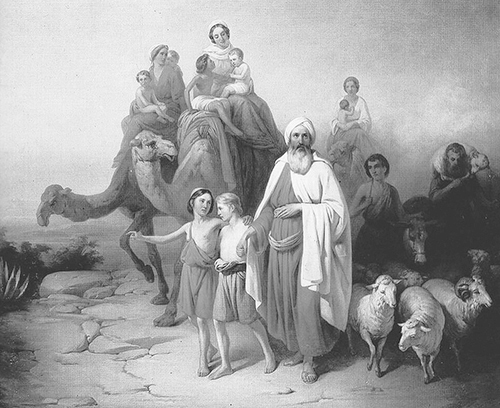
Abraham’s journey
Monday, October 26, 2015
Rogelio Zelada
“Go forth from your land, your relatives, and from your father’s house to a land that I will show you.”
Thus, from the Euphrates valley, in prosperous Ur of the Chaldeans, without any other knowledge, without accurate information, details, routes or maps, the Lord God of his fathers sends Abram, eldest son of Terah, a descendant of Noah, on a dangerous adventure, a journey of no return to Canaan. A path he must undertake expeditiously, moved by the urgency of God; a journey to pastures unknown and landscapes to be shared with Sarai, his beautiful, barren wife; his nephew Lot; his slaves and his livestock.
The plans that the Lord has set for the already old patriarch of the tribe are big and complex; a voyage through which the sacred author has drawn a picture that contrasts the fragile loyalty of Adam and Eve with the absolute confidence of Abram and Sarai, of whom God will request more than is humanly reasonable.
The child who is the hope of the promise does not arrive and time seems to pass unfavorably. Abram even harbors the thought that his servant, Eliezer of Damascus, will inherit his entire estate. Hurt and tired, he pleads with God, who repeats, “Look up at the sky and count the stars, if you can. Just so will your descendants be.”

"Abraham's departure" (detail), 1850, by Hungarian painter József Molnár (1821-1899)
So Abram trusts again and his attitude is the paradigm of faith for every believer. But Sarai, a woman of practical ideas who is sly as a fox, decides to come to the aid of God in her own way. If she cannot give children to her husband, then maybe her slave, Hagar the Egyptian, who is young and strong, can do it.
However, these good intentions turn against her, and what appeared to have a happy ending backfires when Hagar gives birth to Ishmael. Like Eve tempting a weak Adam, Sarai has talked her husband into seconding her plans and in so doing upset the plans of God.
Twenty-five years after abandoning their land, the patriarch has only managed to have a son, not of the promise but of the servant. He remains a stranger in an unknown country, in an environment where false gods are worshipped, and with a body that is tired, drained and lacking strength.
But the patriarch does not stop trusting the promise of his God, because at this stage of his old age he is convinced that God's plans do not depend on work or human intentions, but on deep and total adherence to His person, meaning faith. At this point, his relationship with God grows even more and the Lord not only confirms His promise, but changes their names: They will be called Abraham and Sarah, a divine action that implies transforming the essence and fate of the two. God tells him, "You are to become the father of a multitude of nations," and about Sarah, "rulers of peoples will issue from her."
At this solemn moment, the old man, who has fallen prostrate on the ground, laughs as he says to himself, “Can a child be born to a man who is 100 years old? Can Sarah give birth at 90?” He is satisfied with the son he already has and loves, so he wants to make things easier for God: "If only Ishmael could live in your favor!”
In the sweltering heat of midday, the elderly patriarch sleeps under the brisk shade of the oaks of Mamre. He feels the footsteps of three men nearby and runs to meet them: "Sir, if it pleases you, do not go on past your servant… rest under the tree."
Abraham, who has discovered in them the face of his Lord, races to prepare bread, a tender, choice calf, fresh milk and freshly made curds; a reception of Eastern attentiveness for which the travelers are heartily grateful.
"Where is your wife Sarah?" The old lady listens from the privacy of the tent, the proper place for women. Now she is the one who cannot help laughing when she hears the visitor announcing the end of her infertility and a happy birth within a year, the following spring. Sarah's laughter has not gone unnoticed by the visitors, so the promised child who is to be born will be called Isaac, which means “he laughed," "His laughter,” a laugh not of mockery but of joy.
Knowing the area, Abraham accompanies the three men on their way to Sodom. Two of them go ahead to confirm the evils of which the city is accused, and Abraham is left alone with the Lord. Now the old man tries to save the city, and knowing the "weaknesses" of God asks, "Will you really sweep away the righteous with the wicked? Far be it from you to do such a thing, so that the righteous and the wicked are treated alike!" In an ongoing dialogue of negotiation, he manages to lower the expectations of finding righteous people in Sodom from 50 to 10. Although the Lord accepts the deal, they cannot even find 10 righteous ones. The face of God is revealed as more concerned with the salvation than the damnation or extermination of sinners.
God celebrates the centenary of Abraham with the birth of Isaac, and that is when everything seems to have come to a conclusion, to its best moment. Abraham and Sarah finally have their long-awaited child; the descendant will be the father of new generations, ensuring the continuity of the Patriarch’s sacred seed.
But it is at that moment that God tests Abraham’s obedience to the limit: "Take your son Isaac and offer him up as a burnt offering." And the old man, who fought to save the people of Sodom, is not even able to plead for the life of his son. He knows that what God asks from the believer must be accepted and carried out without hesitation or questioning, although in his case it means not only the sacrifice of his son, but the end of all his hopes.
Side by side with the Lord, the patriarch has journeyed on a profound earthly and spiritual path. The One who is his friend and protector has revealed that the key to their friendship is not sacrifice but obedience, which is why the God of his fathers has blessed in him all peoples and nations of the earth.
Sarah died at a very old age and was buried in Hebron. Abraham, who survived her, had other sons with Keturah; but only Isaac, the son of the promise, will carry out the mysterious plan of God. At his death, the patriarch will rest with Sarah, with whom he lived moments of doubt and confidence, hope and disappointment. Beside her, he traveled the road, the great migration, the great adventure, the surprising path of faith.


Comments from readers